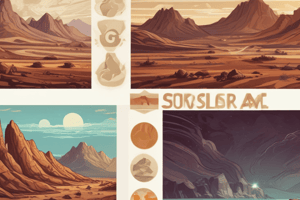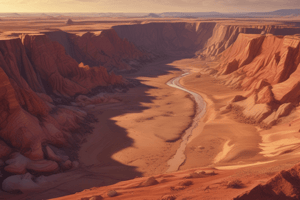Podcast
Questions and Answers
What is the primary factor that influences soil formation?
What is the primary factor that influences soil formation?
- Parent material (correct)
- Climate
- Time
- Biological factors
What is the term for the process of soil development and transformation?
What is the term for the process of soil development and transformation?
- Deposition
- Erosion
- Weathering
- Pedogenesis (correct)
What is the primary consequence of soil erosion?
What is the primary consequence of soil erosion?
- Loss of soil structure
- Increased soil water-holding capacity
- Loss of fertile topsoil (correct)
- Improved soil fertility
Which method of soil conservation involves planting crops to protect soil between seasons?
Which method of soil conservation involves planting crops to protect soil between seasons?
What is the primary component of soil composition that affects soil fertility and productivity?
What is the primary component of soil composition that affects soil fertility and productivity?
What is the term for the arrangement of particles and pores in soil?
What is the term for the arrangement of particles and pores in soil?
Which factor contributes to soil erosion?
Which factor contributes to soil erosion?
What is the importance of soil conservation?
What is the importance of soil conservation?
What is the primary process of soil formation that involves the breakdown of rocks?
What is the primary process of soil formation that involves the breakdown of rocks?
What is the term for the removal of topsoil through natural or human-induced factors?
What is the term for the removal of topsoil through natural or human-induced factors?
Flashcards are hidden until you start studying
Study Notes
Soil Formation
- Soil formation is a slow process that takes thousands of years
- It involves the breakdown of rocks and organic matter into smaller particles
- Factors influencing soil formation:
- Parent material (rock type)
- Climate (temperature, rainfall, etc.)
- Topography (relief, slope, etc.)
- Biological factors (plants, microorganisms, etc.)
- Time
- Soil formation processes:
- Weathering (physical and chemical breakdown of rocks)
- Erosion (removal of particles by wind, water, etc.)
- Deposition (accumulation of particles in a new location)
- Pedogenesis (soil development and transformation)
Soil Erosion
- Soil erosion is the removal of topsoil through natural or human-induced factors
- Types of soil erosion:
- Water erosion (runoff, landslides, etc.)
- Wind erosion (deflation, dust storms, etc.)
- Glacial erosion (glaciers scraping and removing soil)
- Coastal erosion (waves, tides, etc.)
- Factors contributing to soil erosion:
- Soil type and structure
- Slope and terrain
- Vegetation cover and land use
- Climate and weather patterns
- Consequences of soil erosion:
- Loss of fertile topsoil
- Decreased agricultural productivity
- Increased sedimentation in waterways
- Negative impacts on ecosystem health
Soil Conservation
- Soil conservation is the practice of protecting and preserving soil health
- Methods of soil conservation:
- Terracing (leveling and contouring land to reduce erosion)
- Contour farming (planting across slopes to reduce runoff)
- Strip cropping (alternating crops to reduce soil disturbance)
- Cover cropping (planting crops to protect soil between seasons)
- No-till or reduced-till farming (minimizing soil disturbance)
- Importance of soil conservation:
- Maintains soil fertility and productivity
- Reduces soil erosion and sedimentation
- Supports ecosystem health and biodiversity
- Enhances water quality and reduces pollution
Soil Composition
- Soil composition refers to the physical and chemical makeup of soil
- Soil components:
- Mineral particles (sand, silt, clay)
- Organic matter (decaying plant and animal material)
- Water
- Air
- Living organisms (microorganisms, insects, etc.)
- Soil properties:
- Texture (proportion of sand, silt, clay)
- Structure (arrangement of particles and pores)
- pH (acidity/basicity)
- Nutrient content (NPK, micronutrients, etc.)
- Importance of soil composition:
- Affects soil fertility and productivity
- Influences soil water-holding capacity and drainage
- Supports ecosystem health and biodiversity
- Impacts soil's ability to filter and store water
Soil Formation
- Soil formation is a slow process that takes thousands of years
- It involves the breakdown of rocks and organic matter into smaller particles
- Parent material, climate, topography, biological factors, and time influence soil formation
- Weathering, erosion, deposition, and pedogenesis are the four soil formation processes
- Weathering involves the physical and chemical breakdown of rocks
- Erosion is the removal of particles by wind, water, etc.
- Deposition is the accumulation of particles in a new location
- Pedogenesis is the process of soil development and transformation
Soil Erosion
- Soil erosion is the removal of topsoil through natural or human-induced factors
- Water, wind, glacial, and coastal erosion are the four types of soil erosion
- Soil type and structure, slope and terrain, vegetation cover and land use, and climate and weather patterns contribute to soil erosion
- Soil erosion results in loss of fertile topsoil, decreased agricultural productivity, increased sedimentation in waterways, and negative impacts on ecosystem health
Soil Conservation
- Soil conservation is the practice of protecting and preserving soil health
- Terracing, contour farming, strip cropping, cover cropping, and no-till or reduced-till farming are methods of soil conservation
- Soil conservation maintains soil fertility and productivity, reduces soil erosion and sedimentation, supports ecosystem health and biodiversity, and enhances water quality and reduces pollution
Soil Composition
- Soil composition refers to the physical and chemical makeup of soil
- Soil components include mineral particles, organic matter, water, air, and living organisms
- Soil properties include texture, structure, pH, and nutrient content
- Soil texture is the proportion of sand, silt, and clay
- Soil structure is the arrangement of particles and pores
- Soil pH affects soil fertility and productivity
- Soil composition influences soil water-holding capacity and drainage, supports ecosystem health and biodiversity, and impacts soil's ability to filter and store water
Studying That Suits You
Use AI to generate personalized quizzes and flashcards to suit your learning preferences.




